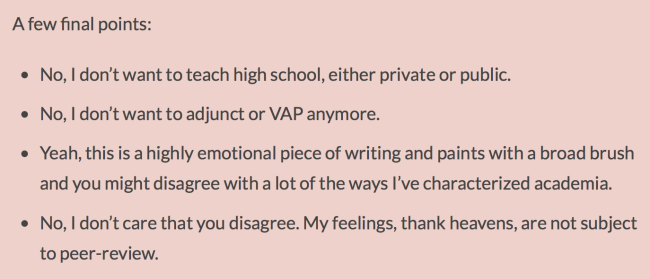You have /5 articles left.
Sign up for a free account or log in.

'The Sublimated Grief of the Left Behind'
Erin Bartram
For all the recent efforts to promote career diversity among Ph.D.s, it’s still awkward to talk about leaving academe due to the poor tenure-track job market. The scholar moving on often feels sadness, frustration and shame, however unwarranted. Meanwhile, those who remain sometimes feel a kind of survivor’s guilt.
Erin Bartram, a visiting assistant professor of history at the University of Hartford, is talking about it all anyway, though, in a new "quit lit"-style essay that’s gained considerable attention (and put her website over capacity Monday).
Awkwardness is kind of her point: Bartram asks readers to resist papering over her departure and instead to "grieve" with her.
Saying she isn’t looking for pity, Bartram wrote, “I just wonder what would happen if we, as a community, stopped saying ‘he’s gone to a better place,’ bringing a casserole, and moving on. What would happen if we acknowledged the losses our discipline suffers every year? What would happen if we actually grieved for those losses?”
Despite the abundance of academic quit lit, Bartram adds, “we’re still not, as a community of scholars, doing a great job dealing with this thing that happens to us all the time.”
Part of the problem with quit lit, in particular, she says, is that the genre "is almost universally written by those leaving, not those left behind, a reflection of the way we insulate ourselves from grappling with what it means for dozens, hundreds, thousands of our colleagues to leave the field."
Bartram said Monday that if readers take anything away from her essay, it’s hopefully that academics -- especially those who have landed coveted tenure-track positions -- take a minute to think of the all their colleagues who have been "lost" along the way.
“Even if we can't bring ourselves to confront the staggering personal costs associated with this system, we should reckon with what has been lost to the fields we study,” she said.
As for her future, Bartram has no plan B. She -- like most other graduate students, she says -- went to graduate school to be a professor, and that’s what she still feels ready for.
“I don’t know how to come to terms with the fact that the life I imagined is not going to happen,” she wrote in her essay. “I’ve already stopped doing my scholarship, other than editorial work for forthcoming pieces. In a few months, I’ll be done teaching. I don’t know how to come to terms with never doing those things again.”
She rejects the idea of continuing to do scholarship on her own, as is often suggested to those who leave academe.
“‘But your work is so valuable,’ people say. ‘It would be a shame not to find a way to publish it,’” Bartram wrote. “Valuable to whom? To whom would the value of my labor accrue? And not to be too petty, but if it were so valuable, then why wouldn’t anyone pay me a stable living wage to do it?”
Being a scholar isn’t “my vocation, nor am I curing cancer with my research on 19th century Catholic women,” Bartram adds. “But more importantly, no one is owed my work.”
Bartram completed her Ph.D. at the University of Connecticut in 2015 and took a visiting assistant professorship at Hartford that year. She'd promised herself that this would be her last year on the tenure-track job market and was recently notified that her last, best hope for a position was gone.
Her first impulse was still to push down the hurt and shrug it off as part of working in academe. It was only after talking to colleagues outside academe, she said, that she realized how impossible her situation was and that she in fact deserved to grieve.
“I didn't decide to leave because I thought I was a failure,” but rather because she’d had so many academic successes this year, Bartram said Monday. “I decided to leave because I realized that if this version of me wasn't hireable, no version of me ever would be. Everyone loved my work, but no one would pay me a stable living wage to do it.”
As for why she wanted to go public with her thoughts, Bartram said she could have just declared, “‘Thanks for everything, but I'm out,’ and left it at that.” Yet “I thought that I had things to say that don't often get said,” she added. “People have responded to the fact that I was up front about the devastating emotional impact of this experience, but also tried to think about how those emotions emerged in and were shaped by a particular context.”
Bartram said she’s since heard from many in similarly precarious positions, but also from those in tenure-track and tenured positions expressing "survivor's guilt." Some have also blamed her for her “failure,” she said -- but she’s not buying that. This is a personal story, but it’s also one about a broken system, she said.
Asked what her story might imply for graduate training, Bartram said, “We need to be honest about the fact that you can do a lot of things with a Ph.D., but you didn't need a Ph.D. to do them.” So framing them as “alt-ac,” shorthand for alternative academic careers, she said, “is sometimes a way to avoid confronting the fact that someone's earned very little money for almost a decade of their life in order to end up doing a job they could have gotten with an [master’s], or even a [bachelor’s degree].” She attributed some of what she called “alt-ac boosterism” to academe’s dependence on the “cheap labor” of graduate students and adjuncts.
Janet Watson, an associate professor of history at UConn, worked with Bartram in graduate school and reached out to her about her essay.
That Bartram is now in such a position “is further evidence of how the academic job market is increasingly dysfunctional in ways that are harmful both to students and to the people who teach them,” Watson said Monday.
Joshua Eyler, director of the Center for Teaching Excellence and an adjunct associate professor of humanities at Rice University, shared Bartram’s essay on Twitter. He told Inside Higher Ed that there isn’t “a lot of space for this kind of grieving, which is why the kind of frank and open discussion of it in her essay is so important.”
Agreeing with Bartram, he said, “I think it is still true that the dominant reason people enroll in Ph.D. programs in the humanities is to one day be faculty." That doesn't mean everyone does so for that reason, he said, "but it is a major motivating force.”
James Grossman, executive director of the American Historical Association, said his organization and the Modern Language Association are working on career diversity precisely because they're confident that keeping people like Bartram "in our respective communities benefits us, the individuals and public culture."
"If we cannot find good ways to maintain productive relationships among historians who follow diverse career paths, there is not only individual loss but also for the discipline and public culture," he added via email.









